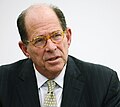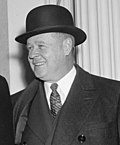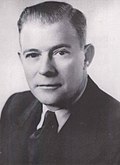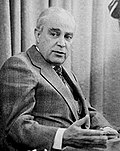Top Qs
Timeline
Chat
Perspective
Democratic National Committee
Top institution of the U.S. Democratic Party From Wikipedia, the free encyclopedia
Remove ads
The Democratic National Committee (DNC) is the principal executive leadership board of the United States's Democratic Party. According to the party charter, it has "general responsibility for the affairs of the Democratic Party between National Conventions",[1] and particularly coordinates strategy to support Democratic Party candidates throughout the country for local, state, and national office, as well as works to establish a "party brand" and to formulate the party platform.[2] While it provides support for party candidates, it does not have direct authority over elected officials.[3]
The DNC was established on May 26, 1848, at that year's Democratic National Convention.[4][5] The DNC's main counterpart is the Republican National Committee.
Remove ads
Role
Summarize
Perspective
The DNC is responsible for articulating and promoting the Democratic platform and coordinating party organizational activity. In particular, it organizes and calls for the Democratic National Convention held every four years to nominate candidates for President and Vice President of the United States, and is subsequently responsible for the Presidential campaign. The DNC is more focused on campaign and organizational strategy than public policy. According to Boris Heersink, "political scientists have traditionally described the parties' national committees as inconsequential but impartial service providers."[6][7]
In presidential elections, it supervises the national convention and, both independently and in coordination with the presidential candidate, raises funds, commissions polls, and coordinates campaign strategy.[3] Following the selection of a party nominee, the public funding laws permit the national party to coordinate certain expenditures with the nominee, but additional funds are spent on general, party-building activities.[8] There are state committees in every state, as well as local committees in most cities, wards, and towns (and, in most states, counties).
When the president is a Democrat, the party generally works closely with the president and the White House largely controls the committee.
Remove ads
Membership and organization
Summarize
Perspective
The DNC is headed by a chairperson, five vice chairpersons, a treasurer, a secretary, and a national finance chair, who are all elected by vote of members of the Democratic National Committee itself.[9]: 5
According to its charter,[1] the committee is further composed of:
- two representatives (including the chairperson) of each state committee or US territory
- 200 additional members apportioned to the states according to their population size (minimum two per state), elected either on the ballot by primary voters or by the state committee or caucus
- two additional members per US territory, selected by their Democratic parties
- the Democratic leaders in the US Senate and House of Representatives
- three Democratic governors (including the chairperson of the Democratic Governors Association), mayors (including the chairperson of the Democratic Mayors Association), county officials (including the chairperson of the National Democratic County Officials), state legislators (including the chairperson of the Democratic Legislative Campaign Committee), and municipal officials (including the chairperson of the Democratic Municipal Officials), respectively
- three representatives (including the presidents) of the Young Democrats of America and the National Federation of Democratic Women, respectively
- two representatives (including the chairpersons) of the College Democrats, the Democratic State Treasurers Association, the Democratic Lieutenant Governors Association, the Democratic Association of Secretaries of State, the Democratic Attorneys General Association, the National Democratic Ethnic Coordinating Committee, the National Democratic Seniors Coordinating Council, and the High School Democrats of America, respectively
- eight representatives of the Democrats Abroad (including the chairperson), who each have half a vote
- up to 75 additional members elected by the committee.

All DNC members are superdelegates to the Democratic National Convention, and their role can affect the outcome over a close primary race only if no candidate receives a majority of pledged delegates.[10] These delegates, officially described as "unpledged party leader and elected official delegates," fall into three categories based on other positions they hold:[11]
- elected members of the Democratic National Committee,
- sitting Democratic governors and members of Congress, and
- distinguished party leaders, consisting of current and former presidents, vice presidents, congressional leaders, and DNC chairs, are all superdelegates for life.
The DNC establishes rules for the caucuses and primaries which choose delegates to the Democratic National Convention, but the caucuses and primaries themselves are most often run not by the DNC but instead by each individual state. Primary elections, in particular, are conducted by state governments according to their own laws. Political parties can choose whether to participate and accept the results of a state's primary election.[12]
An internal organization, the Association of State Democratic Chairs (ASDC), convenes the state and territorial party chairs and vice chairs.[13] The president of the ASDC serves concurrently as a vice chair of the DNC. Jane Kleeb, chair of the Nebraska Democratic Party since 2016, was elected in 2025 as president of the ASDC, succeeding Ken Martin who had served as president since 2017.[14][15] The ASDC is assisted by the Association of State Democratic Executive Directors (ASDED), headed by Brad Martin (executive director of the Democratic Party of Oregon) since 2017.
The DNC convenes at least once a year. An Executive Committee of roughly 65 members determined by the DNC is responsible for the affairs of the party and meets at least quarterly.[16] In addition, a National Advisory Board exists for purposes of fundraising and advising the executive. The present chair is Elizabeth Frawley Bagley, U.S. Ambassador to Brazil.
Current leadership
Ken Martin, former chair of the Minnesota Democratic–Farmer–Labor Party, was elected chair in the 2025 chairmanship election on February 1, 2025.[17][18]
Furthermore, the following non-voting officers execute administrative tasks within the DNC:
- Executive Director: Roger Lau, former campaign manager for Elizabeth Warren for President[24][25]
- Political Director: Alana Mounce, former executive director of the Nevada State Democratic Party
- Chief of Staff: Anatole Jenkins, former national organizing director for Kamala Harris For The People
Remove ads
List of DNC leaders
Summarize
Perspective
Chairs
Deputy chairs
This is an inactive position.
The deputy chair of the Democratic National Committee was re-established by Tom Perez in February 2017 after his win in the 2017 DNC Chair race.
After a close victory over Minnesota Congressman Keith Ellison, Perez appointed Ellison as deputy chair in an attempt to lessen the divide in the Democratic Party after the contentious 2016 Democratic presidential primaries, which saw conflicts between supporters of Hillary Clinton and Bernie Sanders.[26] Perez was seen as being more in line with the Clinton wing, while Ellison was more in line with the Sanders wing.[27] The role's revival in 2017 has been described by critics as largely titular and ceremonial.[28]
On November 8, 2018, Ellison resigned from the position due to his win in the Minnesota Attorney General election.[29] The position remains unoccupied.
Treasurers
Remove ads
History
Summarize
Perspective
The DNC has existed since 1848.[117] During the 1848 Democratic National Convention, a resolution was passed creating the Democratic National Committee, composed of thirty members, one person per state, chosen by the states' delegations, and chaired by Benjamin F. Hallett.[118]
In order to strengthen the national party organization, Franklin Roosevelt proposed in 1925 that the DNC should open a permanent headquarters in order to function "every day in every year" and exist on a "business-like financial basis." In 1929, John Raskob led the creation of the first permanent national headquarters for the DNC in Washington, DC.[119]
Fairness Doctrine campaign
According to a 1975 New York Times report, the Democratic National Committee funded clandestine campaigns to use the Fairness Doctrine to target conservative radio broadcasters who were critical of the John F. Kennedy and Lyndon Johnson administrations.[120] The DNC funded journalist Fred J. Cook and directed his complaint with the FCC, which ultimately led to the 1969 Red Lion Broadcasting Co. v. FCC Supreme Court decision upholding the Fairness Doctrine.[120]
Watergate
In the 1970s, the DNC had its head office, located in the Watergate complex at the time, burglarized by entities working for Richard Nixon's administration during the Watergate scandal.
Chinagate
Chinagate was an alleged effort by the People's Republic of China to influence domestic American politics prior to and during the Clinton administration.[121] In 2002, the Federal Election Commission fined the Democratic National Committee $115,000 for its part in fundraising violations in 1996.[122]
Cyber attacks

Cyber attacks and hacks were claimed by or attributed to various individual and groups such as:
- According to committee officials and security experts, two competing Russian intelligence services were discovered on DNC computer networks. One intelligence service achieved infiltration beginning in the summer of 2015 and the other service breached and roamed the network beginning in April 2016. The two groups accessed emails, chats, and research on an opposing presidential candidate. They were expelled from the DNC system in June 2016.[123][124][125]
- The hacker Guccifer 2.0 claimed that he hacked into the Democratic National Committee computer network and then leaked its emails to the newspaper The Hill.[126][127] During a CNN interview with Jake Tapper, Hillary Clinton's campaign manager, Robby Mook, cited experts saying that the DNC emails were leaked by the Russians but did not name the experts.[128][129] The press and cybersecurity firms discredited the Guccifer 2.0 claim, as investigators now believe Guccifer 2.0 was an agent of the G.R.U., Russia's military intelligence service.[123][125][130][131]
2016 email leak
On July 22, 2016, WikiLeaks released approximately 20,000 DNC emails.[132] Critics claimed that the Committee unequally favored Hillary Clinton and acted in support of her nomination while opposing the candidacy of her primary challenger Bernie Sanders. Donna Brazile corroborated these allegations in an excerpt of her book published by Politico in November 2017.[133] The leaked emails spanned sixteen months, terminating in May 2016.[134]
The WikiLeaks releases led to the resignations of Chairperson Debbie Wasserman Schultz, Communications Director Luis Miranda, Chief Financial Officer Brad Marshall and Chief Executive Amy Dacey.[135] After she resigned, Wasserman Schultz put out a statement about possible FBI assistance in investigating the hacking and leaks, saying that "the DNC was never contacted by the FBI or any other agency concerned about these intrusions."[136] During a Senate hearing in January 2017, James Comey testified that the FBI requested access to the DNC's servers, but its request was denied. He also testified that old versions of the Republican National Committee's servers were breached, but then-current databases were unaffected.[137]
The DNC subsequently filed a lawsuit in federal court against WikiLeaks and others alleging a conspiracy to influence the election.[138]
Remove ads
See also
References
Further reading
External links
Wikiwand - on
Seamless Wikipedia browsing. On steroids.
Remove ads







































